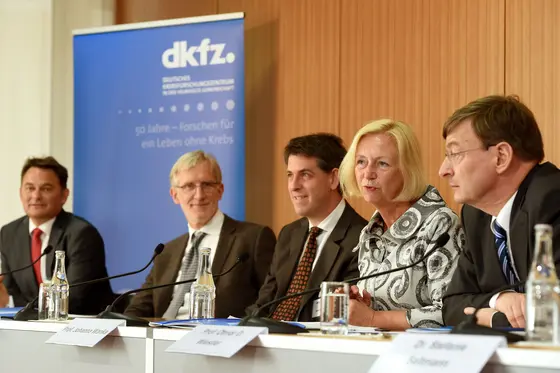“The German Cancer Research Center (DKFZ), founded in 1964 in Heidelberg as a national research institute, has seen astonishing changes over those 50 years and has evolved into an internationally renowned center of high-end research,“ said Otmar Wiestler, Chairman of the Management Board and Scientific Director of DKFZ. From the very beginning, the Center, which was initially not linked to clinics, has had a double mission: to conduct research on the basic biological mechanisms of cancer and translate the results of its research into enhanced methods for the prevention, diagnosis and treatment of cancer.
While the initial years were clearly focused on basic research, the DKFZ has gone on to achieve amazing accomplishments in the translation of its research findings into clinical applications. A crucial factor that has facilitated this development was the foundation of the National Center for Tumor Diseases (NCT) Heidelberg in collaboration with Heidelberg University Hospitals and German Cancer Aid (Deutsche Krebshilfe). The DKFZ thereby gained an “application arm“ and built a robust bridge to clinical cancer medicine.
Since the NCT was founded 10 years ago, it has undergone a rapid and remarkable development. International experts certify its top scientific excellence. Within just a few years, the number of new patients seen at the NCT has risen to over 10,000 per year.
Wiestler has adopted a strategy of continuously adjusting the Center’s research spectrum in order to set the course for its future success. “We want the DKFZ to continue playing in the international top league of cancer research," Wiestler said. “One way to achieve this is by making sure that our results are of noticeable benefit for the patients." In the German Consortium for Translational Cancer Research (DKTK), the DKFZ joins university hospitals at seven partner sites in order to promote an even swifter translation of promising research results into clinical care.
In the past few years, the DKFZ has been particularly committed to “personalized oncology“. This term refers to a concept in medicine by which patients suffering from the same type of cancer are no longer submitted to the same treatment regimens, but that rather adjusts therapies based on the individual molecular characteristics of a patient's disease. In personalized oncology, the genome of a tumor is the most important source of information. Today advanced technology makes it possible to analyze the complete human genome within just a few days. The aim is to find individual changes in a patient's cancer cells and to match these changes to a targeted, personalized therapy.
The strength of the collaboration between the DKFZ and the NCT manifests itself here: For a number of tumor types, whole-genome sequencing has already been integrated into clinical procedures and the results are used to determine the treatment that follows. This development toward personalized, genome-based cancer medicine makes Heidelberg, with the DKFZ and the NCT, a leader in the field worldwide.
Through a study called INFORM, the partners aim to use the potential of personalized medicine to open up a second avenue toward cures for children suffering from cancer that has relapsed. The goal of this initiative, which is coordinated by the DKFZ within the German Consortium for Translational Cancer Research (DKTK), is to search across Germany for a drug that precisely matches the tumor of each child with recurrent cancer, in hopes of curing his or her disease.
Wiestler expects research on tumor stem cells, established at the DKFZ in 2008, to be another area that will deliver results that may enhance the treatment of various cancer types very soon. Following a policy of specific recruitment in recent years, the DKFZ has created an internationally leading cluster in neuro-oncology, drawing together scientists from different disciplines to investigate the causes of brain cancer in children and adults and develop novel therapies for a type of cancer that is still very difficult to control.
“The prerequisite for keeping our research at a top international level is to continue recruiting the best talent from all over the world to the DKFZ,“ says Wiestler. To this end, the DKFZ offers young scientists high-profile training and continuing education throughout all stages of their scientific careers. In addition, researchers find state-of-the-art technical infrastructures at the DKFZ, which has recently been completely refurbished.
In the 1980s, DKFZ researchers helped ban cancer-causing substances from our food and environment, thus protecting many people from developing cancer in the first place. For many years the DKFZ has been strongly committed to the fight against smoking, which has surely prevented thousands of cancer cases in Germany. Many of the innovations developed at the DKFZ are now applied in hospitals around the world, including methods for a more effective and gentler radiotherapy treatment of tumors as well as new diagnostic methods to identify the tissue of origin of specific tumors.
“We are particularly proud of the accomplishments of my predecessor, Harald zur Hausen," Wiestler says. “His discovery that cervical cancer is caused by papillomaviruses was the basis for the development of a vaccine that will protect women from this severe disease in the future. His research was justly crowned with the Nobel Prize.“



